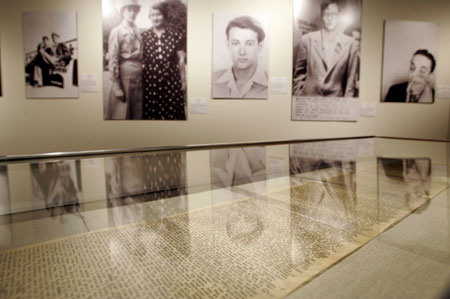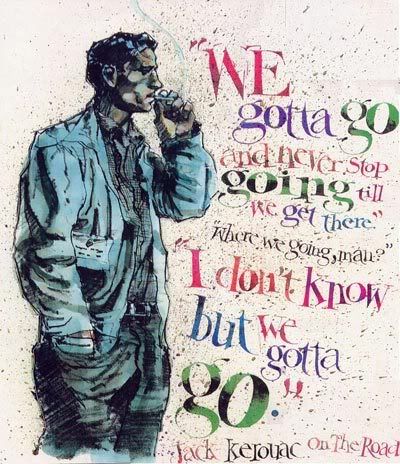
I just finished On the Road by Jack Kerouac. I don't think it has EVER taken me this long to finish a book. I've been reading it for over a month.
AND I DIDN'T LOVE IT – AT ALL. But I want to qualify that sentiment.
I didn't feel like aim of this book was a literary one. It's more about documentation – of Kerouac's experiences with Neal Cassady (in the book each are represented by the narrator Sal Paradise and Dean Moriatry respectively) and of the experiences of young people in America at the time – a documentation of the collective consciousness of the country's disillusioned youth. In that way, it's definitely significant historically and culturally.
It spoke in a new voice, with a new cadence, at a new rhythm – fast paced, wild – MAD.
"The only people for me are the mad ones, the ones who are mad to live, mad to talk, mad to be saved, desirous of everything at the same time, the ones who never yawn or say a commonplace thing, but burn, burn, burn, like fabulous yellow roman candles exploding like spiders across the stars and in the middle you see the blue centerlight pop and everybody goes "Awww!"The above quote pretty much sums up the entire feeling of the book in manner and matter. It's written wildly and it focuses on the uninhibited BEAT generation.
None of this seems revolutionary to us now – but if you think of these people and characters in the context of the buttoned up times of the late 40s and early 50s, it becomes positively sinful and seductive – it becomes a new trend and era. We know that now, but at the time, this book CREATED (or labeled?) an era, a movement – something that could be pointed to, admired, aspired to, and duplicated.
I appreciate that - I get it - but as a standalone piece of literature On the Road wasn't for me. I know that's an unpopular opinion, but had I read this book unaware of its importance and context, I would have honestly regretted reading it (which sounds harsher than the way I intend it – so let me explain).
The books I enjoy are written deliberately, carefully – with care given to word choice, syntax, turns of phrase… I love the craft of writing - and the literature I love is artful, though not self-conscious. 'On the Road' was the exact opposite – everything seemed incidental. I felt like the novel's action was captured as it happened (which I know isn't true. The entire book was written during a 3 week caffeine binge on a seamless scroll) and we, the readers, were scrambling (as the narrator Sal does after Dean) to keep up with the momentum of the machine.
Jane Austen comments on the condition from which Kerouac and his narrator seem to suffer in her novel (one of my favorites), Pride and Prejudice; Mr. Bingley says (while at the equivalent of an Austen era kickback): "My ideas flow so rapidly that I have not time to express them…" to which Mr. Darcy replies, "The indirect boast; for you are really proud of your defects in writing, because you consider them as proceeding from a rapidity of thought and carelessness of execution, which, if not estimable, you think at least highly interesting. The power of doing anything with quickness is always prized much by the possessor, and often without any attention to the imperfection of the performance."
That pretty much sums up how I feel about 'On the Road'. Jack Kerouac himself is quoted as having said, "My fault, my failure, is not in the passions I have, but in my lack of control of them".
But it all makes perfect sense (so was it deliberate?). The characters in the book are spontaneous, haphazard and MAD, always in pursuit and on the move (on the road…) – so if this book was written with too much structure, too much order or attention to consequence it would have felt terribly, terribly wrong.
So I can't say I HATED On the Road - it just isn't my kind of novel. I'm only one person and these just happen to be my reading preferences. I've wanted to read this book for a while. Now I have. Back to regular programming. Up next are 'The Mystery Guest', 'Revolutionary Road', and 'The Age of Innocence'.
Favorite quotes (that weren't already mentioned):
"I like too many things and get all confused and hung-up running from one falling star to another till i drop. This is the night, what it does to you. I had nothing to offer anybody except my own confusion."
"Everything happened."
"He could hardly get a word out, he was so excited with life."
"He's never hung up, he goes every direction, he lets it all out, he know time, he has nothing to do but rock back and forth. Man, he's the end!"





3 Comments:
http://www.photoshare.ru/album148430.html - cover collection :)
I understand what you say about spontaneous prose. And yes, as a reader I would feel rather insulted to read a book that was not worked upon, not gnawed at, not taken seriously by the author himself.
But a lot of 'facts' about how On the Road was written are myths. Yes, the book indeed was written in a burst in three weeks. But months and perhaps years must have gone into its conception.
I am a writer too, a budding one. And I think you would agree that the process of sitting down and typing is not the crux of writing. Writing begins when you are brushing your teeth in the morning, or reading the newspaper, or watching your cat, or walking in the park - a forever continuous process and the act of putting it on paper is only the culmination of that process.
That process of writing On the Road must have begun right when Kerouac took to the road. And every day that he got hung-up with Dean and every night that he wandered alone and every time he saw the sun go down .. all of it contributed to eventually writing the book. Now what does it matter if he finished it in three weeks or three years? The media likes these numbers. We as intelligent readers should not care.
It is interesting that you mentioned literature and documentation. I think all great literature IS documentation - documenting what we as individuals feel about existing in this particular epoch of human history. Isn't that the point of literature itself? To attempt to say a kind of truth about ourselves?
None of the characters in On the Road are 'love-able' or 'real-like.' But that is how life is like too. I love the book because it brilliantly captures some part of us that at once wants to both own and disown the world, that at once wants to live madly and die gently. It is brilliant because it does not believe in grand metaphors, however poetic is language might be.
And it certainly isn’t a book’s fault that it spawns a generation of pseudo intellectuals that adopt the conclusions of its author without going through the process that that author went through. There was no ‘beat generation’ when the book was written. It came years later when the media romanticized it. And so again we are reduced to judging a work by its image in popular culture. And that is sad and dangerous.
On the Road as a standalone is good literature precisely because the craft of writing is not its motive. There are no privileged points of view on ‘craft of writing’ anyway.
Anyhow, I will be doing a much detailed review (not review, I hate that word; I will be writing down things that crossed my mind and perhaps what I learnt while I read the book, and that is all good books should do) in my blog (that I have yet to begin.)
I came across your blog as I was searching for some images. Can I use this image - http://media.photobucket.com/image/on%20the%20road%20kerouac/dirtbag_ballarina/kerouac2.jpg ? I am not certain who holds it.
.. however poetic it's* language might be ..
Post a Comment